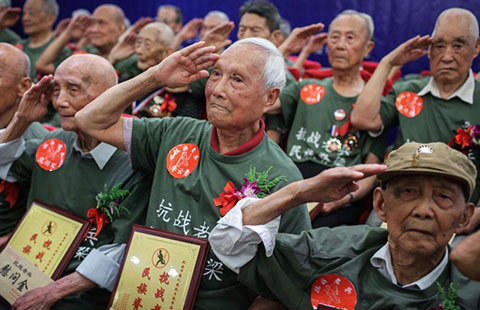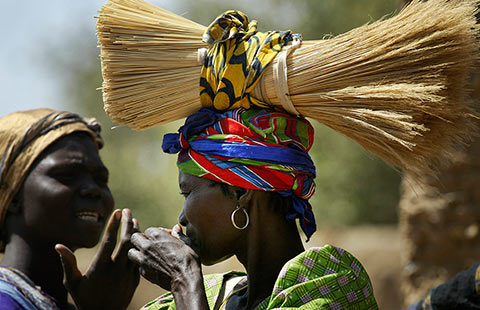Fitness time bomb ticking for Chinese children
Updated: 2015-07-07 07:39
By Yang Wanli(China Daily)
|
||||||||
Youngsters in China are eating more and exercising less, and that's leaving them open to the risk of chronic illnesses, such as heart disease, high blood pressure and obesity, as Yang Wanli reports.
In June, as the end of the spring semester approached, the parents of hundreds of students at Tianjin Mofan Primary School were busy choosing the classes their children would take during a six-week summer camp.
Classes focusing on the arts, sports, English and written Chinese were among the favorites because most parents believe their children need to learn cast-iron skills early on if they are to gain an advantage in adult life.
One parent stood apart from the others, though. Yue Lin, whose son is a third-grader at the school, wasn't interested in the classes. Instead he was more concerned about the boy's health problem - obesity. The 1.3-meter-tall boy weighs 60 kilograms, and a recent health check indicated that he also has high blood pressure. "I was shocked. It's hard to believe a 10-year-old boy can have high blood pressure, which is usually found among middle-aged and older people," the 40-year-old Yue said.
The root of the problem may be partly societal. Before recent amendments to the national family planning policy, most people from Yue's generation were limited to one child, and as a result the "little emperors and empresses" become focal points for the affections of the entire family, which often leads to overindulgence.
"More kids are getting fat nowadays, and a lot of them don't get enough exercise. I understand how people can overfeed their kids through misplaced kindness, but I find it very hard to accept that my son has high blood pressure," Yue said.
Yue's son is not unique. An increasing number of Chinese children are facing the threat of chronic diseases. When the Beijing Health Bureau conducted a survey into the health of the capital's adolescent population, age 6 to 18, last year, the results were alarming: One in 10 had high blood pressure, and 10 percent were classified as obese, more than twice the rate in 2000.
Moreover, in the northern port city of Tianjin a report released by the Women and Children's Health Center last year found that eight in 10 children younger than 6 had high blood pressure, and nearly 10 percent of the 50,000 children in the city's 654 kindergartens had excessive levels of fats in their blood.
"It's alarming. Chronic diseases are threatening more people, not only in the elderly group, but also children," Liu Shugong, director of the center's Children's Health Guide Department, said.
Compared with healthy children, those who are obese will be five times more likely to have high blood pressure, and about half of them will carry the condition into adult life.
"In the past, chronic diseases received little public attention and were not really seen as life-threatening. But now, they are eroding the health of the younger generation, and that will pose a big problem when those kids get older," Liu said.
- Injured ROK tourists in intensive care
- 36 dead, 26 missing after banca capsized in C. Philippines
- Thai navy plans to buy three Chinese subs
- Mass casualties in Indonesian military plane crash
- Japan's LDP lawmaker denounces Abe's security policies
- More than 100 feared dead in Indonesian military plane crash

 Ten photos you don't wanna miss - weekend special
Ten photos you don't wanna miss - weekend special
 US beat Japan 5-2 to win Women's World Cup
US beat Japan 5-2 to win Women's World Cup
 Veterans of World War II honored
Veterans of World War II honored
 The world in photos: June 29 - July 5
The world in photos: June 29 - July 5
 Top 10 most expensive cities in the world
Top 10 most expensive cities in the world
 Italian designer tailors success in China
Italian designer tailors success in China
 People take part in Independence Day parade in Washington
People take part in Independence Day parade in Washington
 Unusual heat wave sweeps across Europe
Unusual heat wave sweeps across Europe
Most Viewed
Editor's Picks

|

|

|

|

|

|
Today's Top News
China measured in response to Clinton hacking claims
Chinese stocks struggle to maintain rally in afternoon
Greece enters uncharted territory after referendum 'no' vote
Chinese embassy warns travelers to be careful in Turkey
China nominates Jin Liqun AIIB's president-designate
For PetroChina, move to Houston pays off
China-France ties 'benefit all'
Concern over US military strategy
US Weekly

|

|







